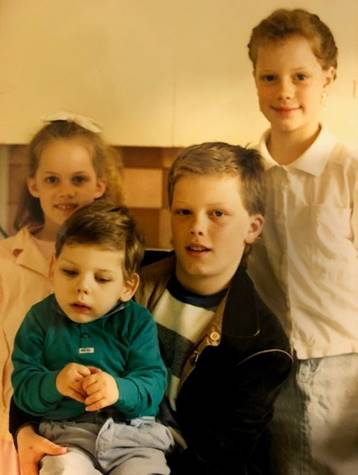
FEATURED IMAGE: A colour picture of four children, with blond hair. The picture shows the writer’s older brother Nathaniel holding Nigel, her older sister Leah standing behind Nathaniel, and the writer standing behind Nigel.
BY: BRONWYN MARTIN
My earliest memories are of my little brother.
I remember when he was born. Three-year-old me, excitedly heading to the hospital to meet him, so small and perfect. I remember him growing and smiling.
And then I remember the night of his accident. Running with my sister to the neighbour’s house, waking up and being told that something had happened to Nigel.
What happened to Nigel was that he was a victim of Sudden Infant Death Syndrome. SIDS is a cruel occurrence that takes the life of 1 of every 2,000 live-born babies in Canada. It occurs when an otherwise healthy baby inexplicably stops breathing. While Nigel did not die from SIDS, he was left with significant brain damage caused by loss of oxygen.
In the months that followed Nigel’s accident, I remember time spent at the University Hospital in Edmonton, many sleepovers at my aunt’s house, missing my parents who were always at the hospital, and surviving on meals brought over by friends and family members.
I remember Nigel coming home, having ice cream cones to celebrate. And I remember the years that followed, learning that my little brother was now different.
Nigel was only four-months-old when his injury happened, and so the extent of his brain damage was unknown at the time. I remember my parents working hard to re-establish brain function. I remember visits to specialists, using special sensory tools, and patterning exercises. I remember my parents getting frustrated, and being exhausted. Ultimately, Nigel’s condition never changed. He was unable to walk, talk, smile or feed himself.
My parents were adamant that Nigel would live at home. In the mid-1980s this was somewhat unconventional, but they made it work and we all helped care for him. I helped feed him through his G-Tube, empty his catheter bag, and helped with chest physio and Ventolin.
As Nigel grew, his care became more complex and it no doubt took a toll on my parents. This also meant that Nigel received more attention than me or my brother and sister. Were there times when I resented this? Of course! There were also times when I was embarrassed at how visible his disabilities were – going out for dinner as a family and feeding Nigel in public always garnered unwanted stares. And of course, there were many times that I was just lonely, because my little brother could not play with me.
Having a sibling with a brain injury is challenging. You are often left to fend for yourself, because as the able-bodied child, you are able to. People tend to forget that you are also a caregiver, despite the fact that your parents do most of the work. There were times that I felt ignored, which was undoubtedly an unintended consequence of our family reality.
I also felt exposed. Due to Nigel’s needs, our home was opened up to the public in a unique way. Over the years we had many caregivers who came into our house (some of whom I liked more than others), which meant there was seldom a day when it was just “us” at home. I found this particularly difficult in my teenage years, becoming protective of both my space and my brother.
But through these feelings of resentment, sadness and confusion I learned that my brother had a super power: Nigel was able to create community through vulnerability.
One of the clearest examples of this is Nigel’s attendance at school . When he reached the age of five, my parents advocated for Nigel to attend the same school as me and my other siblings. They were successful in this goal, and Nigel became part of the same school community as the rest of the family. Although Nigel did not have the ability to learn in the same way we did, the lessons he was able to teach to the broader community were obvious and important.
This was on full display when Nigel graduated from Grade nine and he was carried across the stage by a group of his classmates. Watching a group of 14 year old boys treat your sibling with compassion and respect was a pretty amazing thing to witness, and I don’t think I could have been any prouder.
Nigel passed away in 2007, at the age of 22. His funeral was standing room only, and amidst the sorrow I was overwhelmed with the feeling of love and compassion that came from the community that Nigel had created through his quiet act of just being.
I now have two children of my own. They were born after Nigel passed away, but I make is a point of sharing my memories and telling them about my brother, their Uncle Nigel. It is my hope that Nigel’s legacy of community building through vulnerability can carry on to the next generation.




